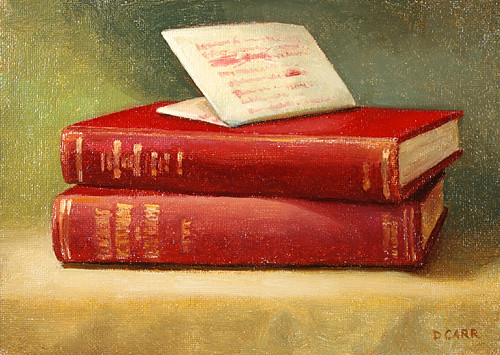9/13: Old English books, oil on canvas panel, approx. 5x7 in. NFS
I know some people wonder why there isn't more of an emotional element or "story" behind each painting. The reason is because I never set out to create complete still-life compositions here (not in a few hours anyway), and personally don't feel that a lemon needs to be sliced in half for it to be a beautiful thing. I'm pretty comfortable with my ability once in a while to come up with stories out of my head, that I don't hear the objects I paint asking me to do things to them in order for people to see what they are all about. The painting process itself and the path to self-discovery that it leads to are what I'm exploring, and there are countless painters everywhere who are much better than me and can make an evocative scene out of a peeled back candy bar or half eaten donut with crumbs, and with infinitely more finesse and je ne sais quoi. This is just my observation of some of the different mindsets behind the "daily painting" concept. But here's the story behind this painting....
I now think that some of my books are interesting on the outside, even if only for having red bindings with gold stamping: red + gold = good. These are two of several great oldies I discovered on eBay: Moore, Knott & Hulbert's The Elements of Old English, and Sweet's very sweet Student's Dictionary of Anglo-Saxon. The folded paper I was using as a bookmark, and on it is an attempt from a few years ago at deciphering "Riddle 7" of the Exeter Book. (On the other side I had begun the nonsense of literally translating "Sunshine of Your Love." Is foran tó úhtes - uhn, uhn, uhn, uh uhhhhn uhn....)
Old English riddles are really quite fascinating, if you are fascinated by this kind of stuff. Here is the original text, followed by my rendition (today made slightly better):
Hrægl mín swígað þonne ic hrúsan trede,
oþþe þá wíc búge, oþþe wado dréfe.
Hwílum mec áhebbað ofer hæleþa byht
hyrste míne, ond þéos héa lyft,
ond mec þonne wíde wolcna strengu
ofer folc byreð. Frætwe míneswógað hlúde ond swinsiað,
torhte singað, þonne ic getenge ne béom
flóde ond foldan, férende gǽst.
My garment is silent when I walk the ground,
Or inhabit a place, or stir the waters.
Sometimes my ornaments and this high air
lift me up above the houses of heroes,
and the strength of the skies then carries me
far over the people. My trappings
resound loudly and make music,
they splendidly sing, when I am not upon
the field and the stream - a traveling spirit.
The riddle's answer is a swan. Most sources I've read give as explanation that the Anglo-Saxons believed the swan's feathers produced music as it flew. I just found however a note by Audrey L. Meaney who suggests this really happens, referring to the common "mute swan" (Cygnus olor) that is native to Britain and is mostly silent but whose wings do "sing" in flight. This is new to me as I know nothing about nature. "Flóde ond foldan, férende gǽst" is a beautiful line, and one reason why I like Old English.




1 comment:
Lovely; thanks for all that.
Post a Comment